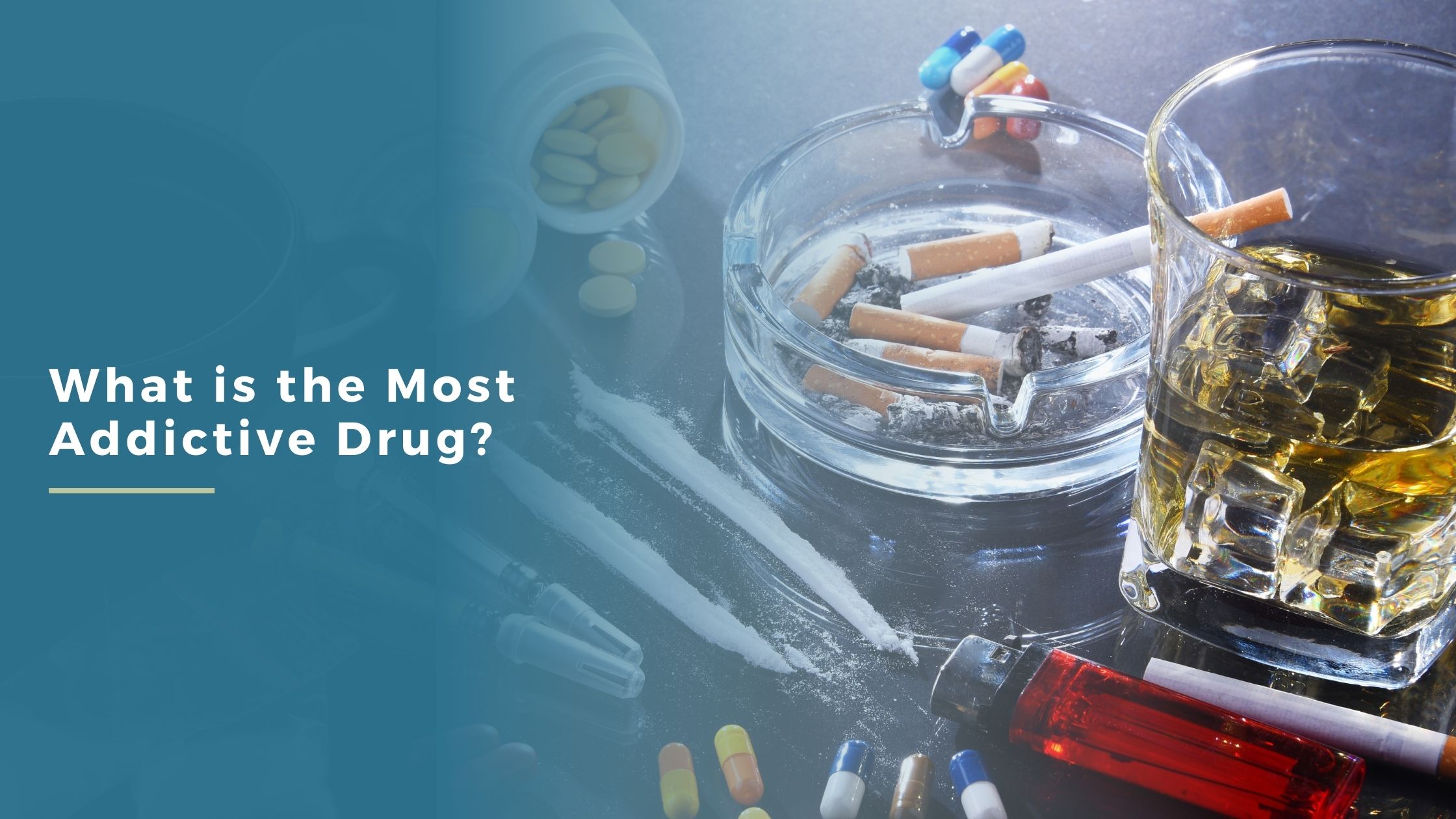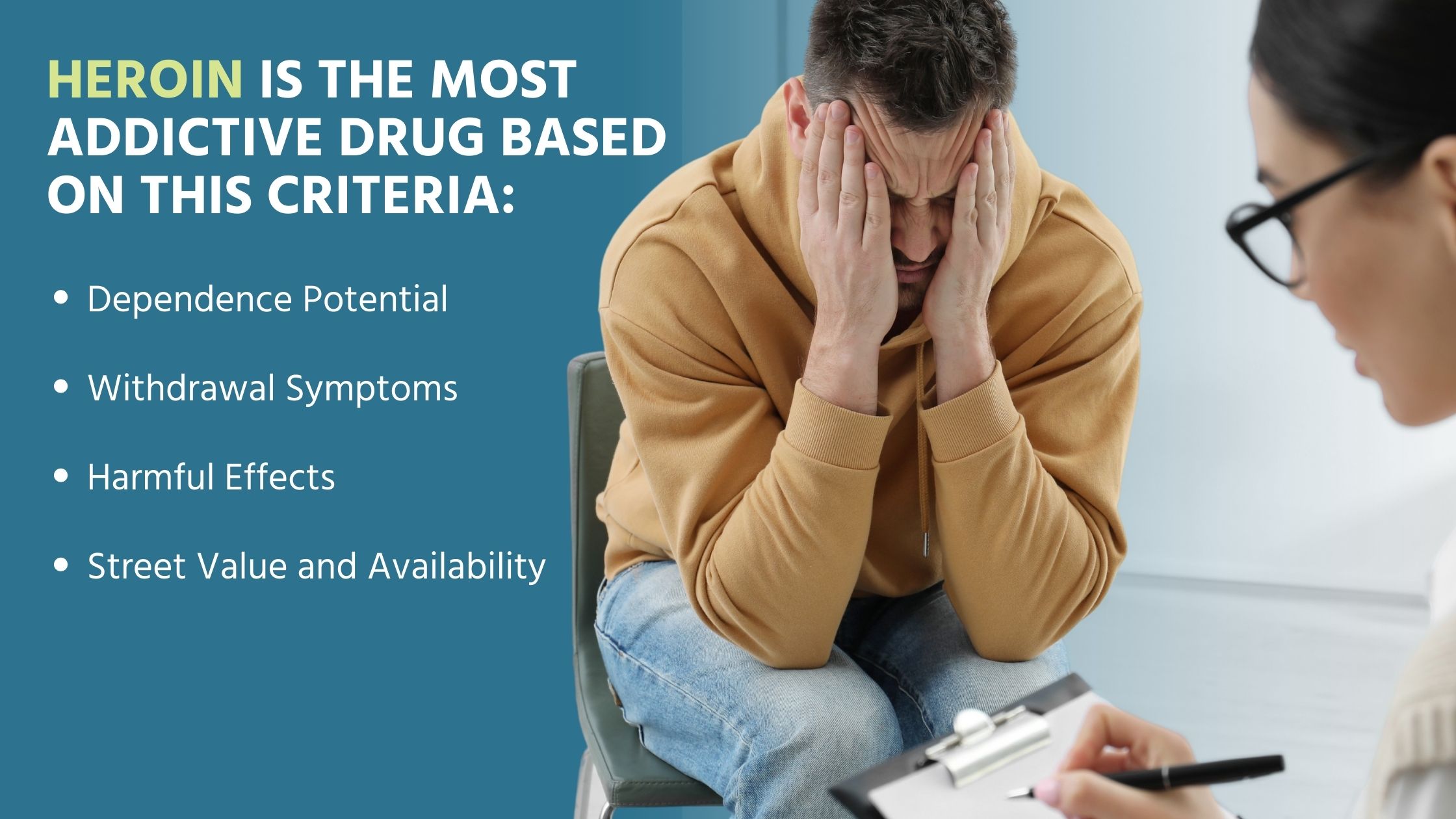In the world of substance use and addiction, one question continues to perplex experts and laypeople alike – what is the most addictive drug? This isn’t a simple question but rather a complex puzzle that unravels the intricate workings of the human brain and body under the influence of various substances.
An attempt to answer this question means exploring not just the physical effects but also the psychological implications and societal impacts of drug addiction.
Understanding Drug Addiction
Drug addiction, also known as substance use disorder, is a chronic disease that alters the brain’s functioning, particularly in its reward system.
The brain’s reward system is a network that reinforces behavior. When a drug enters this system, it triggers a flood of dopamine—a neurotransmitter linked to pleasure—creating a sense of euphoria. This ‘high’ hooks you and initiates the cycle of addiction.
Repeated drug use causes the brain to adapt to this excessive dopamine influx. The result is tolerance—the brain becomes less responsive, diminishing the initial high. Consequently, individuals may consume more of the drug to recreate the original euphoria, intensifying the addiction cycle.
Risk factors for drug addiction are multifaceted, encompassing genetics, environment, and the nature of the drug itself. Genetic factors account for about half of a person’s susceptibility to addiction.
Environmental influences, such as peer pressure or stress, further increase this risk. Additionally, the type of drug matters—some substances, due to their chemical structure and interaction with the brain, are inherently more addictive. Understanding these factors is key to comprehending the complexity of drug addiction.
Criteria for Determining the Most Addictive Drug
To determine which substance holds the title of ‘most addictive drug, it’s essential to consider several criteria, each playing a crucial role in shaping a drug’s addictive potential:
Dependence Potential: Some drugs are more likely to lead to physical or psychological dependence than others. This is often tied to how intensely they interact with your brain’s reward system and how drastically they alter your brain chemistry.
Withdrawal Symptoms: The severity and duration of withdrawal symptoms significantly influence a drug’s addictive potential. The more intense and uncomfortable the withdrawal, the stronger the drive to avoid it by continuing drug use.
Harmful Effects: The extent of physical and mental harm caused by a drug also contributes to its addictive nature. The detrimental effects on one’s health, relationships, and life quality can paradoxically strengthen the addiction, as individuals may use the drug as a coping mechanism.
Street Value and Availability: A drug’s ease of access and affordability can substantially increase its potential for use. If a substance is readily available and cost-effective, it’s more likely to be widely used and misused, increasing its addictive potential.
Various Drugs and Their Addictive Qualities
The realm of addictive drugs is broad and diverse, with each type offering unique characteristics that contribute to their potential for dependency:
Opioids: This category encapsulates substances like heroin and fentanyl, notorious for their potent pain-relieving properties. However, their allure lies in their ability to numb physical pain and the intense euphoria they induce. This combination leads to a high potential for addiction as users seek to replicate this transient state of bliss.
Stimulants: Drugs such as cocaine and methamphetamine fall under this category. They increase alertness, attention, and energy, making users feel invincible and extraordinarily productive.
However, beneath this surge of vitality lurks a high risk of addiction. Prolonged use can lead to severe psychological dependence whereby the brain keeps craving the heightened state offered by these substances.
Depressants: Substances like alcohol and benzodiazepines slow down brain activity, leading to feelings of relaxation or drowsiness. Their tranquility can be seductive, leading to high dependency potential as users may rely on them to escape stress or anxiety.
Hallucinogens: These drugs, including LSD and psilocybin, significantly alter perception and mood, leading to experiences that range from enlightening to terrifying.
Despite their dramatic effects, they are generally considered less addictive than the other categories of drugs mentioned above. However, misuse can still lead to significant psychological distress and potential harm.
The Most Addictive Drug
When evaluating the criteria previously discussed, opioids, particularly heroin, top the list as the most addictive drug. Heroin is a potent opioid with a high dependence potential. It interacts powerfully with the brain’s reward system, creating intense pleasure or euphoria. This strong effect often leads to the rapid development of physical and psychological dependence on the drug.
The withdrawal symptoms of heroin include severe pain, restlessness, and nausea. These withdrawal symptoms are notoriously harsh, further driving the drug’s addictive potential. These discomforts can make quitting heroin a daunting task, which is why most heroin addicts continue to use to avoid withdrawal.
Additionally, heroin is notorious for causing significant physical and social harm. It can lead to devastating health issues, including fatal overdoses, and profoundly impact a user’s social and professional life.
Lastly, heroin’s street value and ready availability have, unfortunately, contributed to its widespread misuse. Its relatively low cost and easy accessibility make it a drug of choice for many, exacerbating its potential for addiction.
Treatment Options for Addiction
Despite the grim reality of addiction, there’s a beacon of hope. There are various treatment options designed to assist individuals on their journey to recovery:
Therapy: Cognitive-behavioral therapy (CBT), motivational interviewing, and other types of counseling can play a pivotal role in recovery. These therapies can help individuals understand the root causes of their addiction, recognize triggers, and develop effective coping strategies to combat cravings and prevent relapses.
Medication: Certain medications can be incredibly beneficial in the treatment of addiction. They can ease withdrawal symptoms during detoxification, reduce cravings, and even block the euphoric effects of drugs, making relapse less appealing.
Support Groups: Organizations like Narcotics Anonymous are invaluable resources for individuals battling addiction. These groups provide a supportive community for sharing experiences, offering encouragement, and fostering a sense of belonging.
The power of peer support in these settings can significantly enhance recovery outcomes, providing individuals with the strength to continue their journey toward sobriety.
Remember, every individual’s journey is unique, and the most effective addiction treatment plan often involves a combination of these options tailored to the person’s specific needs and circumstances.
Get Addiction Recovery Support Today
If you or your loved one is battling an addiction, contact us at Crest View Recovery Center today by calling (866) 986-1371 or filling out this contact form to take the first step toward recovery. You can regain control and start a new chapter with professional therapy, medication, and peer support. It’s never too late to seek help.



